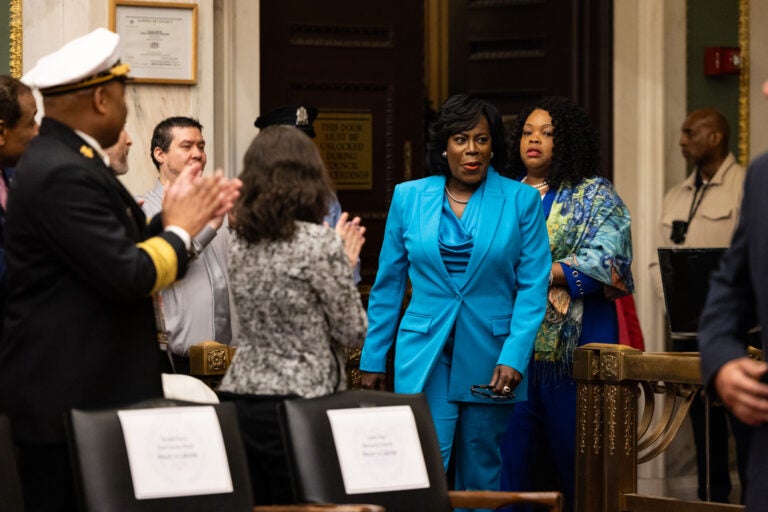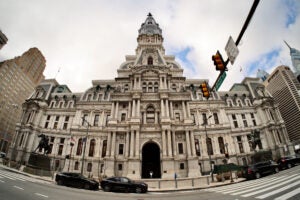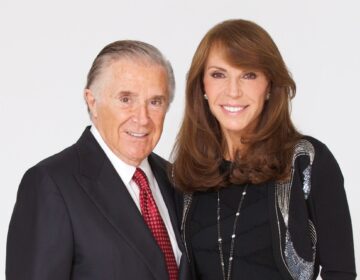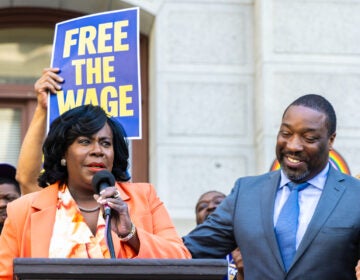Philly Mayor Parker’s budget proposes city wage and business tax cuts
Mayor Cherelle Parker said it’s about balancing the city’s books during a time of financial uncertainty while offering some relief to businesses.
Listen 0:57
Philadelphia Mayor Cherelle Parker enters council chambers to give her second budget address on March 13, 2025. (Kimberly Paynter/WHYY)
Have a question about Philly’s neighborhoods or the systems that shape them? PlanPhilly reporters want to hear from you! Ask us a question or send us a story idea you think we should cover.
Philadelphia’s double tax system on businesses could be phased out in the coming years if Mayor Cherelle Parker’s budget proposal on Thursday and subsequent legislation to codify the tax cuts are successful.
The budget proposal is similar to recommendations by the Philadelphia Tax Reform Commission, which recently released its report.
The Business Income and Receipts Tax is a tax on the gross receipts and net income of companies operating within city limits.
Under BIRT, the city collects 1.415 mills on every $1,000 of gross receipts, which would drop to 1.410 mills during fiscal year 2026 under the budget proposal. By 2030, the gross receipts tax would drop again to 1.380 mills.
By 2039, after the city’s $1 billion pension debt has been repaid, the gross receipts tax would be eliminated under Parker’s proposed budget.
Likewise, the city collects 5.81% on taxable net income. That tax would decline to 5.50% by 2030. And by 2039 would drop again to 2.80%.
Businesses with $100,000 or less in taxable gross receipts are not required to file a BIRT return – but under Parker’s budget proposal that exclusion will be eliminated. Parker said that the city has concerns about violating the state’s uniformity clause which requires all state and local taxes to have the same percentage for all properties and taxpayers.
The net profits tax is 3.75% on Philadelphia businesses and 3.44% for non-resident businesses. No change is proposed for that tax.
BIRT is the third largest source of tax revenue for the city collected from businesses. BIRT is expected to generate nearly $617 million in tax revenue for fiscal year 2025, according to the city manager’s quarterly tax report.
By comparison, real estate taxes generate $930 million while real estate transfer taxes generate $315 million, and the net profits tax is on track to generate nearly $44 million in fiscal year 2025.
Parker’s budget would repeal the construction impact tax but would increase the real estate transfer tax from 3.278% to 3.578% in fiscal year 2026.
City wage taxes are the biggest source of tax revenue and are on track to generate $1.9 billion in fiscal year 2025.
The city’s wage tax for Philadelphia residents is 3.75%, which would drop to 3.70% in fiscal year 2025. By 2030, it would fall to 3.39%.
Parker said she’s already gotten complaints that the business tax cuts aren’t deep enough but needs to balance business tax relief with fiscal responsibility.
“This is what we can afford to do and I shall not be moved,” Parker said during a speech to City Council on Thursday.
The cost of these tax reforms is $210 million by fiscal year 2030, split between $110 million for the wage tax reductions and $100 million for the business tax cuts.
Philadelphia City Council is expected to vote on its budget in June.
The proposed business tax cuts are a good start, said Regina Hairston, CEO of the African American Chamber of Commerce for Pennsylvania, New Jersey and Delaware.
“We’re encouraged that it’s in there and we’re hoping that it can be driven down even further,” Hairston said.
While relief on the gross receipts tax is helpful, businesses pay the bulk of their tax bill on net income.
“The net income portion of the BIRT tax particularly is a barrier for small businesses because it’s on what you may make. So you are not able to really predict what that’s going to be so you can’t plan,” Hairston said. “Stability and predictability is what’s important for very small businesses to be able to grow.”
But not everyone is sure that tax cuts are the right path forward, especially when there is so much uncertainty about federal funding.
“I would only support substantial tax cuts if there was some sort of circuit breaker in there that said if we do have a recession we got to stop,” said Jeff Hornstein, executive director of the Economy League of Philadelphia. “We could be more competitive for sure, but for me, our bigger problems are about workforce development, small business development than they are about business taxes.”

Subscribe to PlanPhilly
WHYY is your source for fact-based, in-depth journalism and information. As a nonprofit organization, we rely on financial support from readers like you. Please give today.









